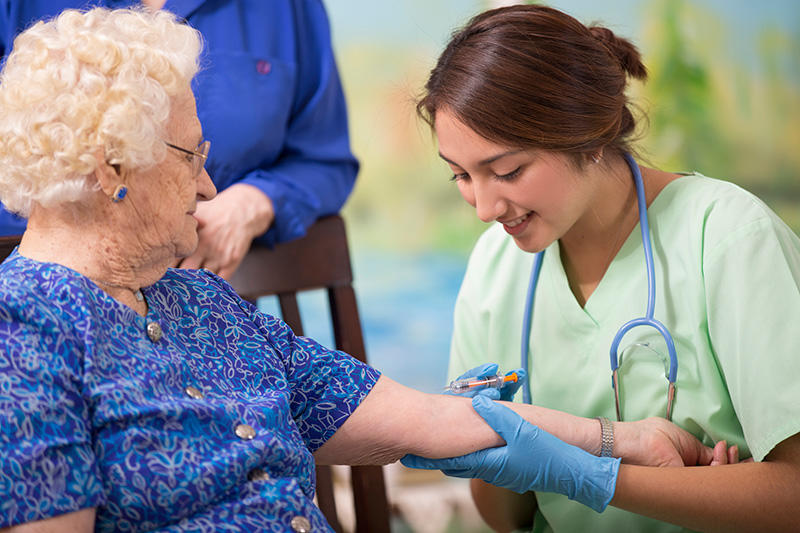Featured
Tags
Share

Do you like the idea of working independently, in a varying environment, while making a huge impact on patients and their families? Home health nursing may be the specialty for you.
Home care nurses travel to patients’ homes to treat people who were recently discharged from the hospital or suffer from chronic conditions. A special subset, hospice nurses, treats those who are terminally ill.
Many home care nurses are employed by or affiliated with a hospital, but others work for independent agencies.
To get the scoop on this specialty, we spoke with Robyn Rice, PhD, RN, a clinical instructor at Chamberlain’s St. Louis campus and instructor in the Healthcare Policy track of the Master of Science in Nursing degree program. Dr. Rice has 24 years of experience in home care and hospice and has authored several well-regarded textbooks on the subject.
She shared with us a few important things to know about home health nursing:
Autonomous but Also Collaborative
Home care nurses generally work independently, but they serve as the eyes and the ears of the entire care team.
“I always say the world of home care isn’t ‘Nurse do this’ but ‘Nurse, what do we do?’” said Dr. Rice. “The relationship with the physician is a very collaborative one. We are out there looking at the patient for the physician and making a recommendation to the physician in terms of what needs to be done with the patient.”
Required Skills
“The goal of home health nursing is to teach the patient and family to be able to manage their healthcare needs at home,” said Dr. Rice. “We want to help them remain independent, achieve a level of wellness and stay out of acute care.”
To be able to perform in this role, she says, a nurse needs a solid medical-surgical background, with preferably at least a year of experience in an acute care setting.
Other “must-haves” include strong assessment and teaching skills and something that might not be so obvious – creativity.
That’s because in a hospital setting, all sorts of supplies are available. In home health, that’s not always the case.
“Sometimes you have to make do with what’s in the patient’s home,” said Dr. Rice. “Sometimes, patients and families can’t afford to buy things, so they make do with newspapers for pads and homemade saline solution and a lot of homemade stuff that you wouldn’t think of. You need to be creative and inventive.”
A Guest in the Home
Throughout their work day, home health nurses witness many different ways of living – different family and social relationships, different religions and food preferences, different standards of cleanliness and hygiene.
In this type of environment, a judgmental attitude on the part of the nurse would get in the way of proper patient care.
“You have to leave your opinions and judgments at home when you work in home care,” said Dr. Rice.
Top Challenges
Home health nurses face many of the same safety concerns as other nurses, such as the potential for needlestick or musculoskeletal injuries. However, they also have their own unique set of concerns, ranging from the dangers of working in a high-crime neighborhood to dog bites, traffic accidents and icy sidewalks.
“It’s just an unpredictable environment,” said Dr. Rice.
Another concern for home health nurses is infection control.
“You’re going from home site to home site to home site,” said Dr. Rice. “Your infection control policies and procedures need to be sound ones and the precautions that the nurses take must be followed.”
While on occasion, you’ll meet an uncooperative patient or family member, she said, “It’s been my experience that most of the public bends over backwards to welcome you. They’re just so grateful to have somebody come look after them.”
The Bottom Line
“Home care nursing is a big, expansive role,” said Dr. Rice. “It’s for nurses who like independence and the freedom of getting out there and really networking with the community, working with patients and their families, and helping people remain stable in the home. If you like that, you’ll do well in home care.”
By Danielle Logacho
More from Careers
Request More Information
To receive the Chamberlain University Program Guide, including associated career paths, please select a program of study.






